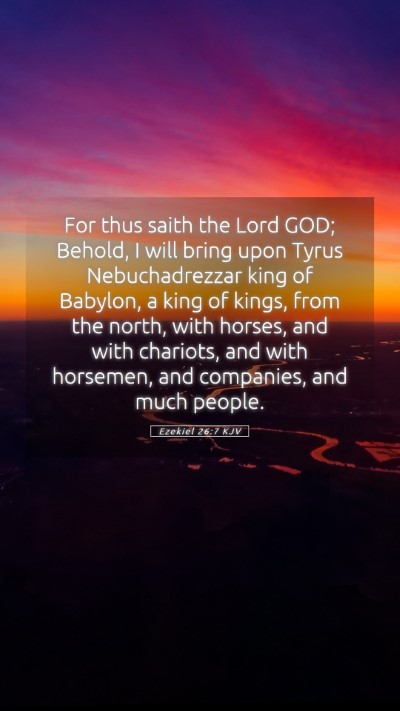Bible Verse Commentary: Ezekiel 26:7
The Bible verse Ezekiel 26:7 states:
"For thus saith the Lord God; Behold, I will bring upon Tyre Nebuchadnezzar king of Babylon, a king of kings, from the north, with horses, and with chariots, and with horsemen, and companies, and much people."
Understanding the Verse
This verse is a prophecy concerning the city of Tyre, indicating the impending judgment that will come through Nebuchadnezzar king of Babylon. The imagery of horses and chariots symbolizes military might and the totality of the coming siege. This scripture serves as a strong reminder of God’s sovereignty over nations and their rulers.
Insights from Public Domain Commentaries
Matthew Henry's Commentary
Contextual Overview: Matthew Henry emphasizes the historical context of Tyre’s wealth and pride. Tyre was a prosperous trading city, but its prosperity made it arrogant. Henry notes that the prophecy of destruction serves as a warning to the proud.
God's Sovereignty: Henry stresses that the verse illustrates God’s control over history and the judgment that comes upon nations for their disobedience. The mention of Nebuchadnezzar shows that God can use even pagan rulers to fulfill His divine purposes.
Albert Barnes’ Notes on the Bible
Military Imagery: Barnes discusses the significance of the military imagery in this verse. The mention of “horses,” “chariots,” and “much people” indicates a powerful force. It symbolizes inevitable defeat for Tyre.
Prophetic Assurance: Barnes explains that this prophecy, while a message of destruction, also reaffirms God’s ultimate justice. Tyre’s downfall would act as a catalyst for God to restore His people.
Adam Clarke’s Commentary
Historical Reference: Clarke provides a detailed historical perspective, identifying Nebuchadnezzar as a pivotal figure in the Babylonian Empire’s conquests. He elaborates on how Tyre’s strong fortifications were considered impregnable, yet God declares its doom.
God's Instruments: Clarke highlights the notion that God often uses earthly rulers as instruments of judgment. This illustrates the complexities of divine justice where God employs nations to accomplish His will.
Significance of Ezekiel 26:7
This verse not only foretells the downfall of Tyre but also serves as a reflection on God’s authority over worldly powers. It is an illustration of God’s ability to dictate the rise and fall of nations, presenting a timeless truth relevant to our spiritual understanding today.
Bible Verse Meanings: Broader Implications
Ezekiel 26:7 encourages believers to recognize the consequences of pride and disobedience towards God. The focus on a specific king fulfilling God’s will shows how God’s plans transcend human actions and intentions.
Application in Daily Life
For modern believers, this verse can serve as a reminder to seek humility and depend on God’s strength rather than worldly wisdom or power. It encourages reflection on the significance of divine authority in governance and personal life.
Cross References
- Isaiah 23: A prophecy against Tyre, highlighting its impending judgment.
- Jeremiah 25:22: Prophecy about the kingdoms of the coast, including Tyre.
- Ezekiel 30:10: The prophecy of destruction extending beyond Tyre.
Conclusion
Ezekiel 26:7 is significant for its prophetic insight and its demonstration of God’s sovereignty over nations. Understanding such verses through biblical commentaries enriches our Bible verse interpretations and Bible study insights. Engaging in online Bible study and utilizing Bible study tools can further deepen our comprehension of these biblical teachings.


